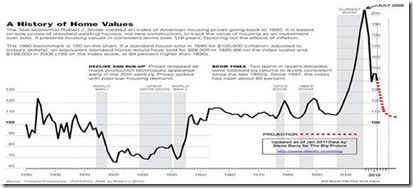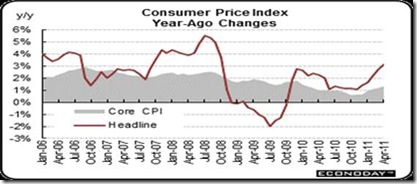The Mortgage Corner
Real housing prices—or prices with inflation discounted—have historically risen one to two percent above the inflation rate, and so been a reliable hedge against inflation. Is that still the case today with our depressed housing market? Several Blogs, including the Atlanta Federal Reserve Blog, maintain that housing prices have stabilized, and over the longer term they are still rising relative to inflation.
They base their conclusion on Robert Shiller’s historical graph of housing prices since 1890 that show prices returning to historical levels that have prevailed since at least the 1950s. It also shows the stratospheric rise of prices during the latest housing bubble that lasted from 1997 to 2006, before bursting. Atlanta Fed’s researcher Dave Altig has compared the Shiller price history to rents, as a measure of fundamental value. I.e., the price-to-rent ratio is a good measure of what homeowners can really afford, since rents track more closely to incomes.
Calculated Risk has posted the most recent update of Dr. Shiller’s data from Barry Ritzholtz’s Big Picture Blog. “A simple back-of-the envelope calculation for this ratio—essentially comparing the path of the S&P/Case-Shiller composite price index for 20 metropolitan regions to the time path of the rent of primary residences in the consumer price index—tells a somewhat different story than the New York Times chart used in the aforementioned Ritholtz blog post”, says Dave Altig of the Atlanta Fed. “According to this calculation, current prices have nearly returned to levels relative to rents that prevailed in the decade prior to the housing boom that began in the late 1990s.”
However, I believe a much more reliable price indicator is the Price to Median Household Income, and that is still 10 percent above the historical norm, at least since 1980 using the S&P Case-Shiller Home Price Index. It shows the ratio at 1.1:1, or 10 percent higher than the norm of 1:1. But household incomes have stabilized and are beginning to rise again with increased employment, which could stop a further decline in housing prices.
The bottom line is that housing prices still seem to be ahead of historical inflation. Home prices rose from 1998 to 2006, along with the consumer price index for consumer goods, then fell sharply during the Great Recession when consumer prices fell.
Keeping in mind the lag time between price fluctuations and consumer buying behavior, the Consumer Price Index has fallen from its 5 percent high in 2008 to 3 percent today and core inflation has declined from 3 to 1.3 percent, a more than 40 percent decline. Though also a ‘back of the envelope calculation’, it does show that housing prices have followed consumer prices down during recessions, and so should rise along with rising prices during this recovery.
There may be a lag of up to one year for that to happen, however. Consumer prices have been rising just since Nov of 2010, due mainly to higher food and gas prices, which may only be short term. So we may have to wait until the end of 2011 to see if inflation is sustained and so capable of boosting housing prices.
Harlan Green © 2011





No comments:
Post a Comment